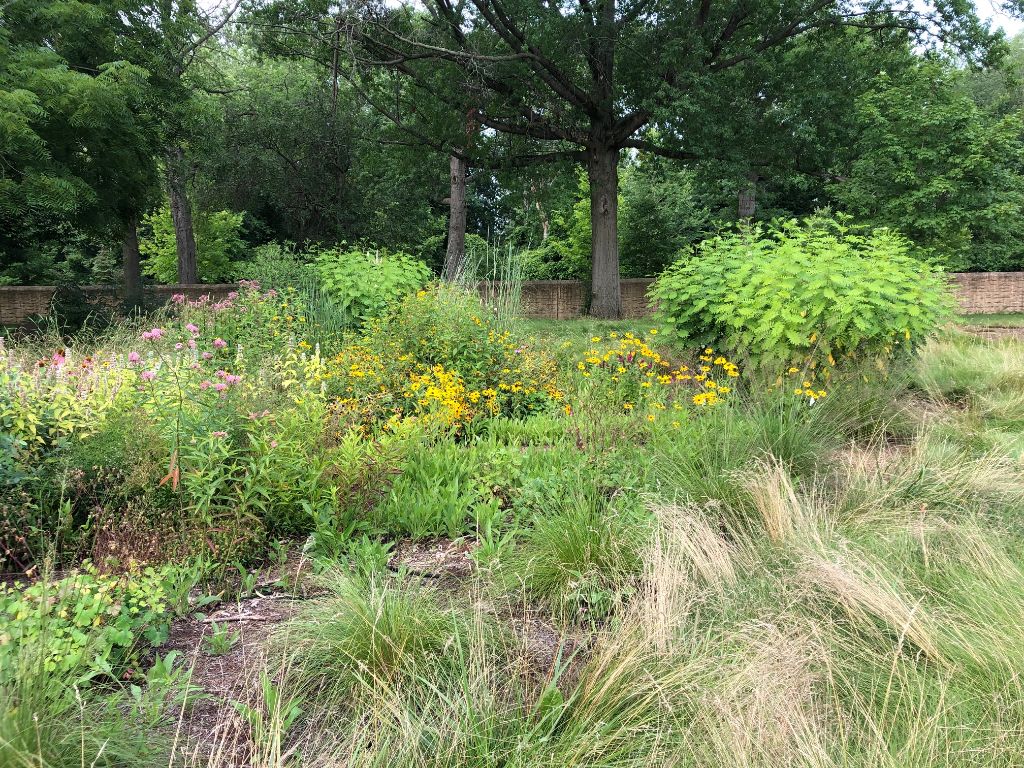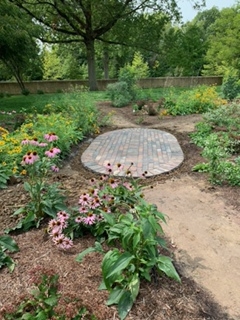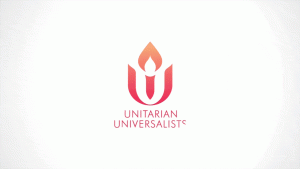The seventh principle: Respect for the interdependent web of all existence, of which we are a part

An interview with Danny Swim, who raises his own food crops and poultry, monitors the health of our building and grounds and was deeply involved in creating our new garden of Indiana plants.
Danny, I’m guessing your interest in nature and self-reliance goes way back. What role has the principle of interdependent life played in your becoming a Unitarian Universalist and being a leader in our congregation?
I felt a connection to the environment as far back as I can remember. This carried over into my education as well as the beginnings of my work career. Having that spiritual type of connection to the environment just came so easy to me and it’s just a very natural thing. Now, having that same type of spiritual connection with other people, or between people, doesn’t come quite so easy to me, and UU has been a place that opened up that possibility for those person-to-person spiritual connections. The fact that the seventh principle is part of UU, it speaks to me, and I get to covenant with other folks that are like-minded and have that same feeling. It’s that person-to-person connection that is the reason I joined UU, which I guess, in a way, that’s the seventh principle exerting itself, making those connections.
Please talk about the Sacred Grounds Garden and why it was created and what it offers to our surrounding community.
Jim Reeder, who is on the Building and Grounds Committee with me – he is my co-chair – was concerned with the amount of mowing that we do throughout the summer and the amount of emissions that this creates. And also, as a UU congregation that observes the seventh principle, he felt we should live into that a little bit more. So he brought those thoughts along with information on a program that is sponsored by the National Wildlife Federation called Sacred Grounds to a small group of interested members and friends of the congregation. It kind of just grew and blossomed from there, so to speak.
With a strong financial and volunteer base, we’re actually way ahead of schedule of where we thought we would be. We’ve already been able to establish two full gardens. One is called a pollinator display garden, and the other is a prairie garden. Now, both of these gardens actually feature native plants throughout them. So now where we had just plain monoculture grass before, now we have this great, new, very diverse native environment that will invite all kinds of wildlife into our yard.
We also were able, with the monetary donations, to put up new signage that will help educate the congregation on the plants, as well as on the invasive species that we’re trying to get rid of. It will also invite neighbors who go through our property to go to the Greenway to come by and look at those signs and help educate them as well. So we’re hoping between the education piece that’s available as well as those gardens that are out there for visual inspiration that other folks will take this information back and hopefully do Sacred Grounds type projects in their own yards. That’s truly that embodiment of that seventh principle moving forward.
Please tell us how the principle of interdependence plays out in how you live your life outside the congregation.

Well, everything in this world is connected. Some of those connections are very obvious, some are not. But as a society, when we start to lose sight of some of those connections, it can lead to really bad things happening to our environment, and it has. It’s one of those things where the gardening and woodworking, the recycling and the repurposing that I do are my way of keeping those connections alive and strong in my own world.
In gardening, we actually took a step farther. That was one of those things where we were able to involve our children in when they were growing up. They each were given a garden space to have as their own to decide what to plant there, to harvest and to tend that. None of them developed a love of gardening out of this, unfortunately, but they did all come away from this experience having a strong sense of those very important connections in plants, and the sun and water and how that actually makes a connection to the food that’s on our tables. That was a very important thing for my wife and me to do.
I think that the seventh UU principle we have is there to help remind us everything is connected and we have tremendous impact – both good and bad – around the world. And we need to stay mindful of that and help to sustain and build those connections and not erode and destroy connections that we want to keep strong.
How do you think the seventh principle applies across our whole country and around the world?
When I think of the seventh principle – and it may seem funny to some people – but I think of the chaos theory. It always comes to mind to me. I can be sitting outside on a breezy day and I can think about visualizing that butterfly on the other side of the world flapping its wings. And I try to think about how that can impact that breeze that is blowing on my face.
Those little small things throughout our world can have very large impacts over time. We want to be aware of that. I feel that it’s our responsibility to minimize the bad impacts that can really build up and improve on those good ones. Things as simple as growing a tomato plant on your patio can have a positive impact, not only on yourself and building those connections with nature, but that’s one less thing that you’re going to be buying from the grocery store that had to travel on a truck from someplace else. Deciding not to throw that AA battery in the garbage can but holding it to go to a recycling program — that’s a small thing, but it’s going to have an impact. It may not be today, but 200 years from now that may be making an impact.
These are small things, but if lots and lots of people do these small things, all of a sudden they’re not so small anymore. They become big things. They can have enormous positive outcomes. One of the things with climate change that we’re dealing with now is kind of the opposite of that. It’s all those little things that have developed over time into really bad, big problems. We kind of just need to reverse that.
Over the past year, with COVID, it’s become more apparent how connected our world really is. It’s really been a lesson in how difficult it can be when we start to lose some of these connections or they’re temporarily cut off, especially those personal ones. My message would be for everybody to try to appreciate all the connections we have in our lives. We want to cultivate those ones that can help us bolster positive impacts, and we want maybe to reduce those ones that don’t have such good impacts. We only have one Earth, and we certainly don’t want that to be one of those connections that we destroy.



